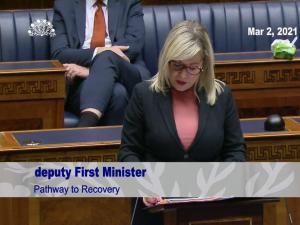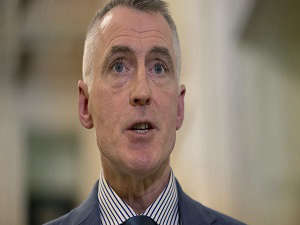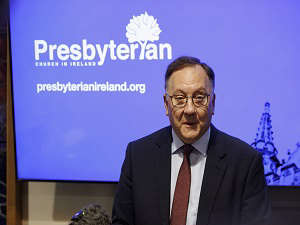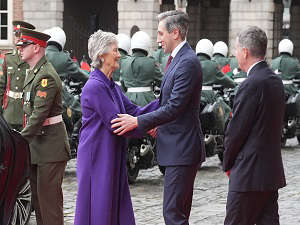
By David Young, PA
Northern Ireland’s lockdown exit strategy offers a “careful, cautious and hopeful” plan for charting a journey out of restrictions, Michelle O’Neill has said.
Outlining the Pathway to Recovery plan to the Stormont Assembly, the deputy First Minister said the region would turn a corner in the battle against Covid-19 in 2021, but she stressed “we are not out of the woods”.
“This is a day very much of hope,” said Ms O’Neill.
Executive ministers signed off on the strategy earlier on Tuesday.
It focuses on nine key areas – retail, hospitality, education and young people, work, culture, heritage and entertainment, sports and leisure, travel and tourism, worship and ceremonies, home and community.
Each will emerge from lockdown in stages. The stages are lockdown, cautious first steps, gradual easing, further easing, and preparing for the future.
The blueprint does not include any target dates, with ministers instead insisting decisions on moving between stages will be based on scientific and medical evidence, not the calendar.
Ms O’Neill said the Executive wanted to avoid a cycle of lockdowns.
“We must do everything we can to try to make this one the last lockdown, with the underpinning insurance policy that this Executive will take the steps needed to protect the health service,” she said.
“Taking all these factors together, we can take some tentative preparatory steps towards the lifting of restrictions. But great care is still needed.
“That is why the Executive has agreed today a careful, cautious and hopeful approach to existing restrictions.”
Ms O’Neill said the plan built in time between phases of relaxations to provide space to examine evidence on the prevalence of the virus.
“That time will be used carefully to look at the results of the regular modelling and assess if it is safe to take the next step,” she said.
“Our aim is to find a safe, secure, sustainable and understandable way forward for our citizens, sectors and businesses. And we will be hopeful, optimistic and realistic in our pathway.”
Deputy First Minister Michelle O’Neill says “gradual and careful” relaxations of restrictions will allow for real time assessment of the impact on health and the economy.
— Q Radio News (@qnewsdesk) March 2, 2021
Departments will meet each week to make transparent decisions on step by step changes based on data. pic.twitter.com/NmcbvFvZEi
The deputy First Minister said she understood that people wanted hope but she said they also realised that the journey out of lockdown had to be careful.
“Hope and care are equally important and that requires a balanced approach,” she said.
Ms O’Neill said the Executive’s plan was “risk-based”, driven by health, community and economic data and analysis.
“We will not be driven by hard dates,” she insisted.
“We recognise that everyone will be looking for certainty but we do not want to set potentially unachievable dates that will only disappoint.”
Ms O’Neill said the Executive would be “open and transparent” in its decision-making.
“We will keep everyone up to date and we will explain our thinking,” she said.
“Keeping restrictions in place will only be done if that is necessary and proportionate to the threat we face from Covid-19.”
Ms O’Neill said the administration was also focused on economic and societal recovery.
The Sinn Fein vice president said co-operation with the Irish Republic and other UK administrations was important,
“We are willing to learn from what works best elsewhere and we are willing to share our experiences here,” she said.
“Our Pathway includes conditions outlined by the World Health Organisation.
“The Executive will of course take our own decisions and we have set out in our Pathway the basis on which those decisions will be reached.
” Evidence-based, necessity, proportionality and sustainability will be key to all decisions, and we will be driven by health, economic and societal impacts and informed by key data sets in those sectors.”

She said she hoped everyone would be able to find some comfort in the strategy.
“The Pathway does not seek to take us back to where we were before the pandemic, and it recognises that there will be some adaptations in our lives,” she said.
“That will be the case across a number of sectors for some time to come.”
Ms O’Neill stressed that the Executive was committed to getting education back as quickly as possible.
She said the stay-at-home message continued to remain important.
The deputy First Minister concluded: “We have hope for this year, and we will get there together.”
Keeping the reproductive rate of the virus below 1 is a key guiding principle of the plan.
The Executive will review the progress of the pathway every four weeks.
Northern Ireland’s lockdown and accompanying stay-at-home message is currently in place until April 1.
Ministers had been due to review that policy on March 18 but that date has now been brought forward to March 16.
The Executive has already outlined plans for a phased return of face-to-face learning at schools.
Only vulnerable children and those of key workers have been attending classes in mainstream schools since January.
P1 to P3 primary school children will return to school on March 8, and on March 22 secondary school children in key exam years – years 12-14 – will go back to class.
On that same date, the P1 to P3s are currently due to revert to home learning for one week ahead of the Easter holidays – to mitigate the impact on infection rates of the secondary school cohort’s return.
However, officials from the departments of health and education were asked last week to examine that aspect of the plan and First Minister Arlene Foster has expressed hope that those primary pupils will ultimately be able to remain in school that week.
No date has so far been given for the return of the wider school population.


 Sinn Fein party member expelled as partner arrested in far-right probe
Sinn Fein party member expelled as partner arrested in far-right probe
 No progress in Donaldsons’ trial before ‘genuine medical issues’ are explored
No progress in Donaldsons’ trial before ‘genuine medical issues’ are explored
 Head of Presbyterian Church in Ireland to step down over safeguarding failures
Head of Presbyterian Church in Ireland to step down over safeguarding failures
 Young girl in critical condiion after road accident involving lorry
Young girl in critical condiion after road accident involving lorry
 Dignitaries gather for inauguration of Catherine Connolly as Irish president
Dignitaries gather for inauguration of Catherine Connolly as Irish president